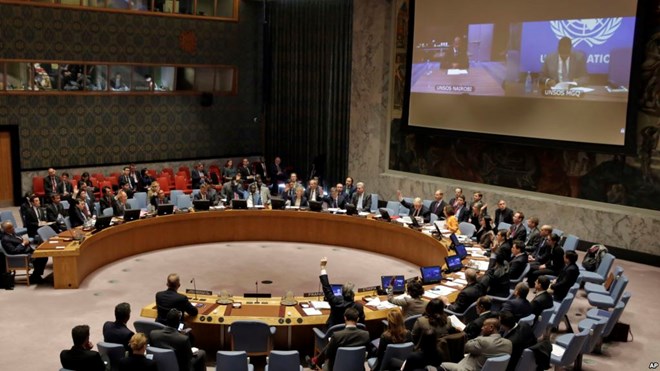
Thursday March 23, 2017
By Margaret Besheer

The U.N. Security Council votes on a resolution concerning Somalia, March 23, 2017. President Mohamed Abdullahi Mohamed addressed the council via a video link from Nairobi.
UNITED NATIONS — Somalia's new president appealed to the international community Thursday to help his nation avert an approaching famine.
"Almost half of my people are facing acute food shortages and about 15 percent are facing famine," President Mohamed Abdullahi Mohamed, known as Farmajo, told the U.N. Security Council.
"I am truly saddened by this situation, as the Somali people are proud, generous, hardworking and truly resilient," he said via a video link from Nairobi. "They would have been the last to ask for assistance if they could somehow find a way to survive and beat their reality."
The president, who took office last month, said people walk for hours in search of food and water. Many livestock have died during a severe drought, taking both sustenance and livelihoods away from the population. Cholera is also on the rise and the rainy season is approaching.
Somalia knows too well the consequences of drought and famine; more than 260,000 people died in the last famine, which hit the country in 2011. Currently more than 6 million people need assistance, and an international appeal for $825 million is only 30 percent funded.
Farmajo noted that this time Somalia is equipped with a government willing to step up to deal with the situation. He noted that the prime minister named his Cabinet on Tuesday, and he said he was optimistic that the parliament would support it so work could begin to tackle the drought.
Challenges
The food crisis is not the nascent government's only challenge.
"Achieving sustainable peace requires more than physical security," the president cautioned. "We must invest in education, jobs and skills to overcome the many challenges Somalia faces." He said this would be critical in efforts to stem radicalization by extremists.
The country is battling al-Shabab terrorists and working to build its own security forces.
A U.N.-approved African Union force (AMISOM) of more than 22,000 troops and police has been the centerpiece of Somalia's security for a decade. The mission cannot remain in place forever, and officials are beginning to discuss the future.
"This is a critical time for security in Somalia," said British Foreign Secretary Boris Johnson, who chaired Thursday's meeting as council president. "We must work together to agree on a long-term plan for international security support in Somalia."
Johnson, who visited the Somali capital, Mogadishu, last week, said they hope to make progress on this at a conference in London in May.
"The most urgent requirement is for a political agreement between the federal government and federal member states on the security architecture of the Somali security forces," he said.
The president also said he would seek a full lifting of the arms embargo against his country at the May meeting.